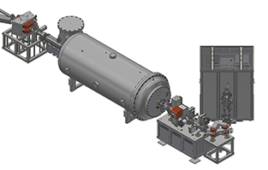ALBUQUERQUE, N.M. (AP) — A federal commission announced approval Wednesday for a uranium enrichment plant in southeastern New Mexico to begin operating more of its massive processing system, which would double the facility’s capacity to process nuclear fuel.
The U.S. Nuclear Regulatory Commission has authorized Urenco USA and subsidiary Louisiana Energy Services to bring online two additional sequential enrichment systems, known as cascades. Although Urenco is tightlipped about its technology and its customers, the enriched uranium it produces can be used to supply fuel for nuclear power plants domestically and overseas.
It is a key expansion for the facility that opened last summer, when the nuclear commission’s authorization made it the first major nuclear facility licensed in the U.S. in three decades.
Urenco spokesman Don Johnson said the company is thrilled. “Cascades 1 and 2 have been spinning and producing all along and our focus remains, as it has always been, on bringing new cascades online to join them.”
Employees began loading uranium stock into the newly authorized cascades Wednesday, and officials expected both to be running within a few days.
The cascades, made up of numerous high-tech centrifuges, are central to the way the plant near Eunice enriches uranium. The process employs an elaborate network of pipes, electrical systems and sensors in sterile, gymnasium-sized halls.
Uranium, in its natural state, doesn’t contain enough of a particular nuclear isotope to work as fuel in certain power plants. The enrichment process can greatly boost the necessary isotope concentration.
Authorization for the two additional cascades followed nuclear commission inspections earlier this year. The agency said in a statement that the inspections provided reasonable assurance that the design, construction and use of safety items will “protect against natural phenomena and the consequences of potential accidents.”
The agency inspectors looked at everything from paper receipts to the steel works that connect the centrifuges inside the cascade halls. They also interviewed employees and contractors.
About 350 employees work at the plant, along with another 700 construction workers.
The work force is expected to remain stable for the foreseeable future despite the authorization and the start-up of the two cascades, Johnson said.
However, the company is considering another expansion that would again double the plant’s capacity. Funding is available for design and other preliminary studies, but Johnson said federal approval would be needed to build on to the plant.
In a region where pump jacks dot the landscape and oil field service trucks keep the road hot, elected officials have been anxiously watching the Urenco plant grow. They see it as a key element in Lea County’s effort to diversify its economy beyond the boom-and-bust cycle of oil and natural gas development.
Last year, the county rebranded itself as the EnergyPlex, a place where everything from oil and natural gas to nuclear and renewable energy has been welcomed.
Dividends are already being paid in the form of jobs, new housing and businesses, and additional tax revenue.
New companies are also looking to locate in the region. One of them is Idaho-based International Isotopes Inc., which plans to build a nuclear facility west of Hobbs.
Louisiana Energy Services and International Isotopes agreed last year that International Isotopes would provide uranium deconversion services for the enrichment plant.
International Isotopes plans to use its proposed facility to deconvert the depleted uranium tails that result from the enrichment process. It would also simultaneously extract fluorine gases that could be sold for use in manufacturing solar panels and medical equipment.
International Isotopes announced Wednesday that it now holds title to 640 acres about 25 miles from the enrichment plant following a land transfer agreement with the state and the Economic Development Corp. of Lea County. The company plans to use about 40 of the acres to build its plant once licensed by the nuclear commission.
SOURCE: The Associated Press




